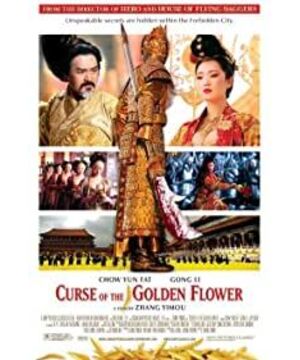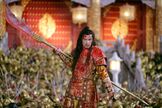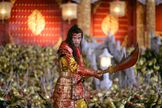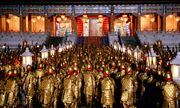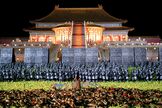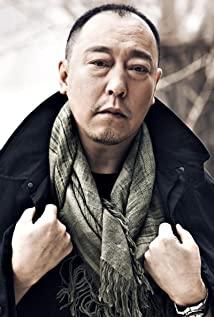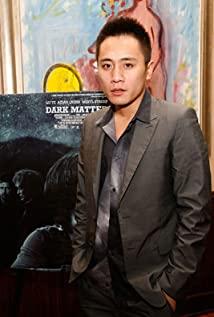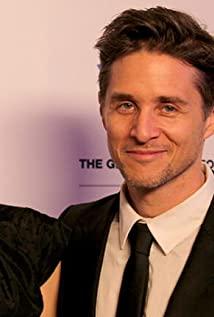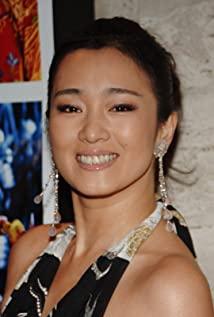Zhang Yimou is one of the most important film artists in the world. His early films were not just about personal struggles, they explored the deep nature of human longing and resonated on a global scale . But after the peak of his career, he began experimenting with ancient martial arts films such as "Heroes" and "House of Flying Daggers." The Golden Armor of the City is his third attempt at this film style, and this time, Zhang has restored his artistic temperament and successfully matched his earlier works.
"Loyalty, filial piety, propriety and righteousness" are the four virtues of Confucianism. They are good in nature. They have always been the moral guide of traditional society, but they have also been used by feudal monarchs to exploit the general public . All four of these virtues advocate the restraint of personal desires until the vision of the country is realized. The ramifications of this notion are a potential theme in Zhang Yimou's "Golden Armor," which also corrects the views expressed in "Heroes."
It's a masterpiece, as well as a dark, disturbing work, in which Zhang deftly conveys a sense of gloom and despair. The screenplay is adapted from Cao Yu's 1934 "Thunderstorm", which focuses on the moral deficiencies of modern Chinese society . Zhang, however, moved the story back to the post-Tang period of the Five Dynasties in 928, and the story revolves around the palace of an ancient great king. The plot does not have a clear structure, but I have divided it into four main phases or "behaviors" as follows:
The king and his palace
At the beginning of the movie, the huge palace is managed by thousands of attendants, their work is mechanically synchronized. At this time, an imperial army led by the king returned to the capital after three years of expedition, and the second prince Yuanjie also returned at the same time. When the great king greeted him, after passing the contest, it was clear that the great king was still a formidable swordsman.
However, a story conflict is soon revealed. Prince Yuanxiang has been having an affair with a queen who is not his biological mother for three years. In addition, the queen also suffered from some strange diseases, which was caused by the addition of poison to the queen's regular medicine by Jiang Taiyi according to the secret order of the king. This poison will destroy the queen's mind. In order to protect his position, Jiang Taiyi also used his daughter Jiang Chan, the queen's maid, to have an affair with the prince.
When the Great King summons the royals, we see the "rules" of his rule. Seeing that the queen was unwilling to take the prescribed dose of medicine, he reminded her that she must follow the king's order: "take medicine in moderation and do things in moderation!" . In fact, he considered it his duty to maintain law and order in his own family in order to set an example for the entire country. This is in line with the tradition of feudal autocracy, and the orders of the great king must strictly comply with the Confucian tradition, provided that the great king is considered to be "the divine authority of the monarch." Sitting at the top of the hierarchy, the great king must embody and enforce the Confucian system based on "rules" for all to follow. So the story of the queen is all about how to survive under this kind of oppression.
Jiang family conspiracy
The queen came across the rendezvous between the prince and Jiang Chan, and learned of their affair. From a secret meeting with the wife of Imperial Physician Jiang, she also learned that poison was being given to her. But after this meeting, Madame Chiang was caught by palace guards and brought before the king, who recognized her as his first wife 25 years ago. Moreover, I learned from Mrs. Jiang that the king was only a small commander at the time, who had conspired with King Liang to usurp the throne and married his daughter, the current queen, as his wife. The king also ordered the destruction of his Fa wife's family at that time, but he did not know that Fa's wife ran away and married Jiang Taiyi. In view of the fact that the prince is not the queen's biological mother, and Madam Jiang is his biological mother. This means that Jiang Chan's relationship is incestuous. In any case, in order to get rid of the chaos caused by the Jiang family, the king sent Imperial Physician Jiang to go to Suzhou immediately with his family to take up the post of governor.
Until now, the queen has been considered powerless, but now she is secretly planning a rebellion. She tells Yuanjie that she wants to force the king to pass the throne to him, not the crown prince. Yuanjie said that he needed to abide by "loyalty, filial piety, propriety and righteousness" and could not betray his father. But seeing his mother slowly being poisoned by the king, he decides to go against the "rules" and act according to his compassion for his mother.
At the same time, the prince mounted his horse to chase his lover Jiang Chan on the way to Suzhou. He met her at a roadside post house, and learned from there that the queen was colluding with the army, so he ran back to the capital, hoping to stop it. When Jiang Chan's mother was worried about incest, she veiledly told her to stop thinking about the prince, but she also rushed back to the palace. At this moment, some mysterious black-clothed warriors came to Jiang Taiyi's post house and killed everyone. Obviously, the king's intention was to destroy the Jiang family, and only Madam Jiang fled back to the capital.
Resistance and truth
Back at the palace, the terrified prince quarrels with the queen over her plans for a rebellion . When his fears were confirmed, the prince angrily stabbed himself, but not fatally. The great king went to his son's bedside and told him that he had always known about his affair with the queen, but everything was under control.
That night, at a royal banquet, Jiang Chan and her mother were caught by guards and brought before the king. All participants eventually confront each other, and the truth of the anger is revealed. The prince and Jiang Chan were told of their incestuous relationship. The king told Jiang Chan and her mother that they knew too much and had to destroy them. They tried to escape, but the warriors in black killed Jiang Chan and Madame Jiang quickly and silently .
armed rebellion
At this point, the climax of the story takes place. With most of the secrets being revealed, an armed rebellion begins, and Yuanjie attempts to storm the palace with ten thousand golden-armored warriors . To everyone's surprise, in the palace, Yuan Cheng, the third prince who was usually inconspicuous, suddenly killed his elder brother, Prince Yuan Xiang, and tried to usurp the throne. But the king's black warrior appeared again and quickly took control, and then the king took off his belt and beat Won-sung hard.
Meanwhile, Yuanjie's attack continues. Although his troops were initially successful, the king had been warned by Yuan Xiang and prepared a large imperial army to suppress and completely annihilate Yuan Jie's troops. Yuanjie was captured alive and brought before the king. The king told him that his punishment was to poison his mother himself. Yuanjie did not want to give in, so he chose to commit suicide . Finally, the tyrannical king again ordered the queen to drink poison.
It's a Shakespearean tragedy, full of carnage and grief on the way to its ideal destination, with obstacles, losses, and enemies of all kinds. In Zhang Yimou's films, the protagonist's goals are rarely achieved. For example, in "Judou" and "Raise the Red Lantern", even survival is denied: all is lost, all hope is dashed , the protagonist was eliminated, but the scale of "The Golden Armor of the City" is even bigger.
As far as the expressiveness of the film is concerned, Zhang Yimou goes to great lengths to create an oppressive, threatening environment that makes the palace a luxurious prison. The film technology also has a part of martial arts and swordsmanship, but although the swordsmanship moves are superb, the scenes are small and do not create the expressive atmosphere that the film really wants. And it's the film's larger scope and long takes involving thousands of people that create a relentless feeling of captivity and destruction.
Chow Yun-Fat's "The King" is a calculating, cruel personification at the top of an autocratic system . His demeanor and demeanor were not terrifying, but he came to be seen as a sign of some mysterious dark force, which was also reflected in those warriors in black, who suddenly descended from the sky and swiftly wiped out all their targets. These "inhuman" killers work silently, seeming to represent some kind of evil force beyond human comprehension. In this sense, they are like ghosts or spiritual demons from which they cannot escape.
The battle scene where Yuanjie's army is destroyed is a typical example. The huge moving metal fence imprisoned Yuanjie's army, which created a feeling of claustrophobia, the rebels were unable to carry out the swordsmanship they were prepared for , instead, they were quickly wiped out by the "rain of arrows" fired from outside the wall, in Here we see human power being destroyed by unfathomable mechanical forces. After the rebels were annihilated, thousands of industrious attendants began to whitewash the peace, quickly removing all the corpses, and replanting chrysanthemums in the courtyard of the palace, making it exactly the same as before. No sign of resistance to the king's rule is allowed.
From the earliest scenes in Golden Armor, we can see that the imperial system operates mechanically, and people are forced to suppress their personalities and act in sync with those around them. Their humanity has been lost and they have become part of a machine. To support this suppression of human nature, the four Confucian virtues of "loyalty, filial piety, propriety and righteousness" were used to promote blind obedience to the ruling class . Zhang describes this blind obedience to autocracy as an indescribable fear, which is in stark contrast to the idea of blind obedience to an almighty ruler for the sake of social order, which he advocates in "Heroes."
What I want to say about this is that social chaos is a fundamental problem, and it is necessary to reduce arbitrary violence and chaos through human institutions or state machinery. However, these "virtues", "rules", and "systems" are often used by the top ruling classes to maintain their dominance and suppress human autonomy to a certain extent. In films like Judou and The Big Red Lantern, this oppressive social restriction, a system that keeps humans operating according to inhuman, mechanical rules, is in it. But in "The Golden Armor of the City," this oppressive system is more clearly expressed.
This is the role of the Jiang family in the story. Imperial Physician Chiang is not an evil person, but he must play his part and contribute to the mechanized evil . He knew that if he disobeyed the king's orders, he and his family would be wiped out. Therefore, he and his daughter agreed to the order of the system and participated in the poisoning of the queen. In the end, however, they "know too much" to be wiped out anyway. Similarly, the prince is unwilling and dare not violate the "rules". He revealed his mother's plans to his father, which made the rebellion doomed.
However, two characters rebel against this oppression, and interestingly, they are both women: the queen and Madame Chiang. Knowing that they will be destroyed, these two heroines openly defy unconquerable oppression, and they cannot contain their innermost sense of what is right. The queen revealed at one point that she knew she would be defeated in the end, but she wouldn't give up without a fight, and she still threw away the medicine bowl desperately. In the end, Prince Yuanjie was also persuaded to accept this idea. In the final scene, he tells his father that his rebellion wasn't to become a "big king," but to save his mother. He acts according to his conscience and the true feelings of his heart.
The article was first published on the public account: the most TOP film critics
View more about Curse of the Golden Flower reviews


